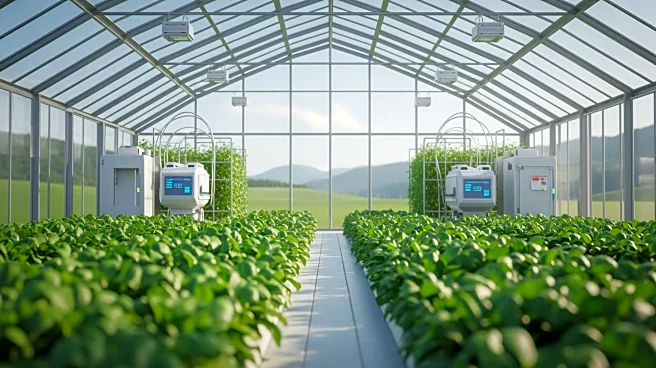What's Happening?
Several companies in the AgriFoodTech sector have recently secured significant funding to advance various sustainable agriculture initiatives. Notably, NextProtein has raised $20.7 million in a Series B funding round to scale its insect protein production
in Tunisia. Additionally, Source.ag has secured $17.5 million to enhance AI applications in controlled environment agriculture. The EVERY Co has also raised $55 million to scale egg proteins via fermentation, marking a transition from 'promise to proof.' These developments highlight a growing trend in the AgriFoodTech industry towards innovative and sustainable food production methods.
Why It's Important?
The influx of funding into AgriFoodTech companies underscores a significant shift towards sustainable and innovative agricultural practices. This trend is crucial as it addresses global challenges such as food security, resource optimization, and environmental sustainability. Companies like NextProtein and Source.ag are at the forefront of this movement, utilizing technology to improve efficiency and reduce the environmental impact of food production. The success of these initiatives could lead to broader adoption of sustainable practices across the agriculture industry, potentially transforming food systems and contributing to global sustainability goals.
What's Next?
As these companies continue to develop and scale their technologies, the AgriFoodTech sector is likely to see increased interest and investment. Stakeholders, including investors, policymakers, and industry leaders, will be closely monitoring the progress of these initiatives. The successful implementation of these technologies could lead to further regulatory approvals and market expansion, particularly in regions seeking sustainable agricultural solutions. Additionally, collaborations and partnerships may emerge as companies seek to integrate these innovations into existing agricultural frameworks.
Beyond the Headlines
The advancements in AgriFoodTech not only promise economic benefits but also raise ethical and cultural considerations. The shift towards alternative proteins and AI-driven agriculture may challenge traditional farming practices and dietary habits. As these technologies become more prevalent, there will be a need for dialogue around their implications on food culture, employment in traditional agriculture, and the ethical treatment of animals. These discussions will be essential in shaping the future of food production and consumption.















